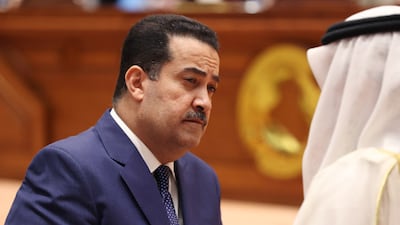Iraq’s prime minister-designate Mohammed Shia Al Sudani vowed on Sunday to act against corruption after authorities announced nearly $2.5 billion was embezzled from the account of a government agency.
The Iraqi Integrity Commission announced it was opening an investigation into the theft of 3.7 trillion dinars, while confirming that the case is currently before the judiciary.
The amount was stolen from the General Tax Authority's trust account held by a branch of the Rafidain Bank, according to the Iraqi finance ministry.
“We will never hesitate to take real measures to curb the corruption that has so brazenly spread in the joints of the state and its institutions,” Mr Al Sudani tweeted on Sunday.
“We have put this file in the first priority of our programme, and we will not allow the money of the Iraqis to be stolen, as has happened with the funds of the General Authority for Taxes in the Rafidain Bank.”
Snap elections were held last year following nationwide protests that erupted in October 2019 to decry endemic corruption, decaying infrastructure and the absence of services and jobs for youth.

On Thursday, Iraq’s parliament finally elected Abdul Latif Rashid as the country’s new president, who then tasked Mr Al Sudani to form a new government to end a year of political gridlock.
Mr Al Sudani faces a challenge in the coming weeks to appoint a new cabinet of ministers after the Iraqi political bloc led by influential Shiite cleric Moqtada Al Sadr said on Saturday that it would not join the new government.
Mr Al Sudani, a former minister, has the backing of Mr Al Sadr's Iran-backed rivals, the Co-ordination Framework, which controls 138 out of 329 seats in the Iraqi legislature.
Meanwhile, Iraq's outgoing Prime Minister Mustafa Al Kadhimi appointed Hayam Nemat as acting finance minister after accepting the resignation of Ihsan Abdul Jabbar, the state news agency said on Saturday. Mr Jabbar remains Oil Minister.
In mid-August, Mr Al Kadhimi assigned the Finance Ministry to Mr Albdul Jabbar after the resignation of Ali Allawi, who stepped down in protest against what he called widespread corruption and the influence of political parties over the country’s revenue.
Last week, Parliament voted to remove Mr Abdul Jabbar over "mismanagement" and for allegedly failing to send financial statements to parliament.
Mr Nemat will now fill the position until a new government is formed.
A $2.5 billion fraud
The embezzlement Mr Al Sudani spoke of is just one of a number of major corruption-related scandals in the war-torn country. It was revealed late on Saturday by Mr Abdul Jabbar.
He used his resignation letter from the role of acting finance minister to share the results of the investigation. More documents related to the investigation were leaked to media on Saturday.
The investigation found that 3.7 trillion Iraqi Dinar (slightly over $US2.5 billion) was fraudulently paid to five companies by the General Commission of Taxes.
The money was paid to the companies through 247 cheques between September 9, 2021, and August 11 this year from the General Commission of Taxes account at the State-run Rafidain Bank.
At least three of the companies were established in July last year, according to registration documents included in the leak.
Trading companies and individuals who have dealings with the government have to deposit a specific amount of money as a performance guarantee, from which later the taxes will be deducted.
Afterwards, the companies and individuals can apply to withdraw what is left from their deposits.
“These amounts have been stolen by the companies through the cheques issued by the General Commission of Taxes instead of going to the real beneficiaries,” the investigation concludes.
The owners of the companies in question and how they escaped scrutiny is still unknown, nor whether they are linked to any political parties or politicians.
“This economic crime is an extension of smaller irregularities that are widespread in the Finance Ministry’s departments and are continuing,” Mr Abdul Jabbar said in his resignation letter.
“This is one of the reasons behind the collapse of the Iraqi economy and the loss of the biggest chunk of the state revenues by experienced groups,” he added.
He said one of the reasons behind his removal as acting finance minister was this case, accusing those behind the scheme of a campaign against him which resulted in his forced resignation. He didn’t divulge more details.
Corruption has been rife in Iraq since the 2003 US-led invasion that toppled Saddam Hussein. Many politicians have been arrested or removed from office for the practice.
Iraq is considered one of the most corrupt countries in the world. It ranked 157th out of 180 nations on Transparency International’s 2021 corruption index.
The endemic corrupting was among the key motives behind 2019 pro-reform protests that engulfed major cities in central and southern Iraq.
The months-long protests forced the previous government to resign and early elections to take place.

